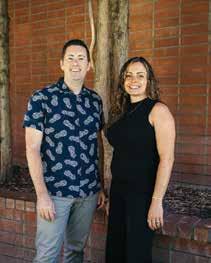
































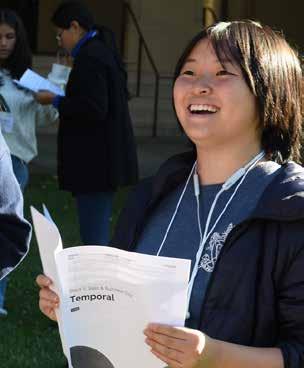



































Official publication of the California Choral Directors Association, an Affiliate of the American Choral Directors Association
Eliza Rubenstein, editor cantate editor@gmail com
We welcome and encourage CCDA members to contribute articles, announcements, music and book reviews, job vacancy listings, photographs, and other items of interest to Cantate!
Please send queries and article ideas to cantate.editor@gmail.com. You are also welcome to submit completed articles, but please note that not all articles received will be published.
Deadlines for publication are as follows: August 15 (Fall issue); November 1 (Winter issue); March 1 (Spring issue). The editor reserves the right to edit all submissions.
Please visit our website (www.calcda.org) or e-mail us at cantate.ads@gmail.com for complete information on advertising in Cantate, including rates, deadlines, and graphics specifications. Advertisements are subject to editorial approval.
On the cover: Members of the Coastal Regional SSAA Honor Choir perform under the direction of Iris Levine. Photo by Robyn Peters.

WHEREAS, the human spirit is elevated to a broader understanding of itself through study and performance in the aesthetic arts, and
WHEREAS, serious cutbacks in funding and support have steadily eroded state institutions and their programs throughout our country,
BE IT
that all citizens of the United States actively voice their affirmative and collective support for necessary funding at the local, state, and national levels of education and government, to ensure the survival of arts programs for this and future generations.
California Choral Directors Association empowers choral musicians to create transformative experiences for California’s diverse communities.
CCDAisa501(c)3 non-profit,tax-exempt corporation and an affiliate of the American Choral Directors Association.
CaSMeC January 15-19, 2025 SaCra Mento
aCDa national ConferenCe MarCh 18-22, 2025 DallaS, texaS
CCDa SuMMer ConferenCe at eCCo July 20-23, 2025 oakhurSt


Arlie lAngAger
studied oboe and arts administration before completing graduate work in voice performance and pedagogy, and received her master of music degree in conducting from the university of calgary. for the next decade, she taught courses in elementary classroom and secondary choral education and directed award-winning vocal jazz ensembles as well as the university chorus and chamber choir. she completed her doctoral degree in choral conducting at the university of texas in austin and joined the faculty of miracosta college in 2008. arlie and her best dog, nakiska, live in carlsbad
Thelight comes on. The fog lifts. Eureka!
You know that feeling of joy: when we finally put the pieces together, when we understand something on a deeper level, when we see something in a new way. And we celebrate it when our singers have those aha moments, too. Something clicks, a chord tunes perfectly, the singers marvel. These are the life-changing moments that are a special part of choral singing.
But getting there can be exhausting.
With one of my novice ensembles, I had to take rehearsal time to describe the most basic principles of conducting. One student who was new to singing and choral music asked earnestly if my gesture meant that she should change notes every time I made a new gesture. One part of me wanted to laugh because it seemed so obvious, but on the other hand, but the student’s question led to a few fundamental aha moments.
Another semester, a new student who had been president of his high school choir raised his hand during rehearsal a couple of months into the semester. He said that his school conductor used solfege in their choir, but until that very day, he hadn’t realized there was meaning to using it. I might have rolled my eyes in shock if it weren’t for his excitement from his aha moment!
It’s not just our new or novice singers who can get bogged down by the everyday challenges in rehearsals. We may have singers in our ensembles who have been participating for years and are downright resistant to our best efforts use solfege, or sight-reading exercises, or even voice pedagogy in rehearsal. One night after guiding my community choir through ways to unify their vowels, I was surprised that one disgruntled retired singer angrily chastised me, “If I wanted to learn how to sing, I would just take voice lessons!” Not all our singers are willing to take the risks it takes to discover something new.
But when our singers trust us, sometimes
the aha moments come much later.
One year my choir included a couple of very novice, emerging tenors. On the night of the performance, the two young tenors suddenly sang with a gusto I’d never heard in rehearsal, using a tone like two angry geese fighting. The recording of our performance captured every decibel of their bold vocalizing. I was so disappointed that the excellent work of the ensemble was lost. At the choir’s next rehearsal, I played back the recording for the students. I couldn’t avoid addressing what we all could hear, but I also knew I needed to keep the focus on what we could learn from the whole performance, rather than focus on the individual singers.
Years later, I got an e-mail from one of the geese, who wrote to thank me for the things he’d learned as my student, and to say that he was working on his graduate degree in voice: “After my experience with your chamber choir, I found a profound love for classical music that has kept me going for years since.” Those aha moments showed up years after the fact.
When I was a music ed student, I wondered if my professor ever got tired of saying the same things over and over to the choir. It seemed Sisyphean to repeat, endlessly, watch me for the cut-off, don’t breathe there, let’s use a rounder vowel. But, after decades of saying those very things to my singers, I realize it feels fresh with every new piece and every new singer.
Not all CCDA members work with “students,” but all of us have the incredible privilege of guiding singers through their music. We’re in it for the long game, and rehearsal after rehearsal, we invite our singers to seek the challenge of finding new experiences in the music.
As I set my goals for the new year, I want to bring aha moments into every rehearsal, and cherish the deep privilege of bringing these singers into a bigger world of sound and art.

elizA rubenstein is the director of choral and vocal activities at orange coast college, and the artistic director of the orange county women’s chorus she holds degrees from oberlin college and uc irvine, and she is a former animal shelter supervisor and the co-author of a book about dog adoption eliza’s family includes her partner, julie fischer, and five dogs. she’s passionate about vegan thai food, photography, and the st louis cardinals and st louis blues, even when her teams are terrible, as they both have been recently
Facebook the other day in an effort to postpone grading for a bit longer, I stumbled upon a post with a lengthy comment thread in a group for choral directors. The original poster, who directed a non-auditioned community chorus, needed help figuring out what to do with a soprano who consistently and confidently sang much more loudly than everyone else in the ensemble, and fellow conductors were happy to offer their suggestions.
Most of their ideas represented pretty respectable pedagogy: Do more warm-ups focused on listening. Record the group and ask them to listen to and critique themselves. Remind everyone not to sing more loudly than their neighbors (a virtual impossibility, if we’re being technical, but okay, sure).
Some commenters went mildly passiveaggressive, encouraging the director to give dynamic directions to the whole group while fixing her eyes on the problem soprano. And more than a few advised her simply to move the loud singer to the alto section, which—predictably and appropriately— raised the hackles of the altos in the crowd, who weren’t interested in being a dumping ground for demoted would-be spintos.
running them through ChatGPT first?
Another thread asked how to get audiences to clap, and not clap, at the proper times in a concert. Once again, many of the answers involved fairly elaborate body-language choreography or type-spacing program-layout tricks designed to encourage the desired behavior. Almost nobody said what seemed obvious to me: Explain to the audience how to know when to clap, and why we do it that way.
People don’t know what we don’t tell them. Singers don’t always think our group instructions are “for them.” Audience members who aren’t experienced concertgoers find most of our moves and mores to be mysterious and arcane, and the ones we make between songs are no different in that regard from the ones we make within them.

Do you know what remarkably few people suggested? Talking to the singer. Why? Why wouldn’t that be the first and most obvious response? Are we so accustomed to the collective culture of choral rehearsal that we’ve let our one-on-one skills grow rusty? Do we avoid conflict lest we lose a singer or poison the spirit of a section? Do we not trust ourselves (or our colleagues) to have challenging conversations without
Sopranos want to sound pretty. Audiences want to clap at the right times. Sometimes they just need a little help.
Andsometimes we need a reminder that even if our college professors always told us to stop talking and start conducting (it me), there are moments when we need to use our words.
If a soprano is singing too loudly, let’s assume she doesn’t know it, rather than that she’s a diva. If an audience claps between songs in a set, let’s assume they liked what they heard and didn’t realize they weren’t supposed to show it yet. Let’s credit them with acting in good faith, and figure out how to communicate more clearly next time.
After all, if we’re afraid to talk to an overly enthusiastic singer or a supportive audience, what else are we afraid to talk about? If we can’t find the words to request different behaviors without causing insult, how will we ever be able to talk with our singing communities about subjects that are really difficult?

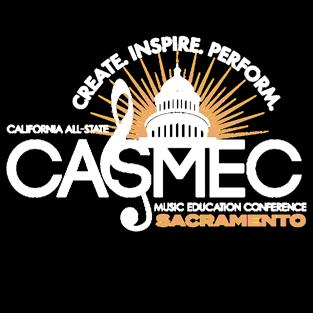







Gather with ACDA members as we celebrate our rich choral heritage, highlight the music and expertise of our present-day choral colleagues, and look with excitement to the next generation.
Registration is Open! acda.org/conferences
Register early to take advantage of discounted
Prices increase after February 5.
Need to pay with a PO? Simply complete your conference registration online and select the Proforma Invoice option at checkout.
ACDA hotel room blocks offer discounted rates of $215-245 per night, plus tax and parking. You must complete your conference registration to gain access to the hotel booking links. Discounted hotel rates expire February 24.




“My Lords, my Ladies of the 21st century, harken to my pronouncement. As an officer in King Henry’s guard, I have been entrusted with the grave responsibility of easing thy transport across the years to 16th-century England. By dint of thy attendance upon us, ye demonstrate the willingness to undertake the journey. However, a willing heart alone is not sufficient, for the way is arduous.
“King Henry asks, nay, the king demands that ye strip away the frenzied cares and bitter sorrows of the modern age. Ye must prepare thyselves for revelry and joy. Ye must leave behind thy worries of the morrow and prepare for the fellowship of this good company.
“And ye must believe.”
Every season of the Madrigal Dinners at UC Irvine, under the careful supervision of Joe and Melinda Huszti, started with a variation on the Crier’s speech. And the Dinners meant so much to so many.
First, the facts: Originally created in 1978 as a fundraiser for the UCI Choral Organization, the Madrigal Dinners were a reenactment of the Christmas feast in the court of King Henry the Eighth.
There were 27 years of performances, ending in 2007. The Dinners served over 78,000 paid meals, including 4,900 gallons of potato leek soup, 26,000 pounds of Leggs of Fowle, and 9,800 platters of Boar’s Head, all presented with 371,000 serving utensils and on top of 9,800 red tablecloths.
Melinda became an expert on Tudor England: She researched and wrote the script every year and designed and created over 300 costumes. Joe beat us into shape musically, and sometimes he found us lacking. We all recall court rehearsals on stage with Joe holding his head in one hand while conducting with the other.
Over 3,400 people performed, worked behind the scenes on ticket sales or stage management, or created the food. Between guests, court members, servants, musicians, technical staff, and caterers, the Madrigal Dinners touched over 82,000 people. That’s more than the current population of Tustin, Fountain Valley, or
Aliso Viejo.
But what about the intangibles? Joe and Melinda had a very special gift. They recognized and believed in everyone’s talents and gave them room to thrive.
The Dinners were like being in the trenches with your peers. People relied on you, and it was important to live up to your commitments. Alliances were made—even some marriages—and I still have friends I met through the “Mad Dins” whom I hold dear.
Working live theater in a hoop skirt, singing with your ears covered by a hat, and holding a platter with flaming rum gives you nerves of steel. I’ve always said that I survived the Dinners, so you can throw me into any situation!
We learned that there is no such thing as an inside joke. If your audience couldn’t be included, odds were the joke was at their expense. Work harder at being clever. Innovation and creativity saved the day: Safety pins substituted for zippers, a wassail pitcher with extra greenery was reborn as a Boar’s Head, and an ordinary glass ball became magic in our Jester’s hands.
While in the public eye, be sure to make it appear that everything is perfect. Then, behind the scenes, run like hell to fix a crisis.
Fitting thousands of people in costume taught me the art of persuasion. Because orange really did look terrific on certain skin tones, but first you needed to convince people to try it on! And, of course, the difference between anti-perspirant and deodorant. (Polyester holds on to odors. Enough said.)
Henry the Eighth was our king. And though his historical behavior was less than stellar, for us it was always Christmastide, and he was our most worthy prince. In typical Huszti fashion, Joe and Melinda turned a potentially ordinary fundraiser into the extraordinary. Because, as Joe frequently asked, “Why not?”
As we celebrate Joe, the many gifts he gave us, and his legacy, we also close the book on the magic of the Madrigal Dinners. The most fitting farewell comes from the Crier, once again, at the close of the show.
“Alas, good friends, the fragile threads of love and music which have bound us one to the other can not endure beyond these walls. Thus, I must now bear thee forward to thine own era for thy world awaits thy return. And ye must go alone, for history’s gentle bonds tie to us to the Sixteenth Century and we can survive in no other.
“Should ye yearn after us, ye may find us pressed dryly between the pages of thy histories, until yet another Christmastide brings us hence once more.
“We are warmed by the knowledge that fine music lingers in the hearts of those who seek it. Thus may our songs abide with thee as we take our leave.”
The Madrigal Dinners, and especially Joe and Melinda, are pressed dearly into our hearts forever.
Vicki Sullivan Jaeger (UCI class of 1991)
Itis a privilege to celebrate Joseph Huszti’s legacy as a teacher, mentor, artist, and friend. On the topic of “rehearsals with Joe,” you might say “they contained multitudes” and be done, but that would be understating it. Anyone who sang with Joe has a veritable trove of rehearsal memories—great ones, unique ones, crazy ones.
When I spoke with friends who also studied and worked with Joe, some sent specific examples, but a much larger number took the opportunity to share more encompassing descriptions: “He was completely committed artistically”; “making music with Joe was like coming home”; “rehearsals were completely musical.” Those phrases ring true for me as well.
During my senior year in high school in Newark, Delaware, Joe arrived one day to rehearse our choir. I remember very little of the rehearsal specifically, or what he asked of us (likely things simultaneously inspirational and unattainable) or how we sounded (likely loud and out of tune), but in line with the descriptions of my colleagues, somehow, in that rehearsal, I realized that here was someone after whom I could model myself—a genuine musical mentor that my life had thus far lacked. I knew I could actually learn in his rehearsals.

I went on to the University of Delaware, studying both voice and conducting with Joe. It bears mentioning that as an undergraduate I arrived possessing no real study skills and no practice discipline, and I was infamously unreliable. But Joe tolerated my missteps, disciplined my actual sins, and taught me each day as if I had promise. In his wisdom, he saw something that at that time was hidden even from me. What stuck with me were those Delaware rehearsals—Bruckner motets, Bach “Magnificat,” Lotti “Crucifixus,” and Thompson “Alleluia”—works that came heartpoundingly alive in his hands. I was learning in spite of myself.
Following Joe to his next post at Boston University, I worked as a graduate assistant in the school’s choral program and at the Tanglewood Institute. My most powerful musical memories of Boston days are also rehearsals— Monteverdi madrigals, Barber “Reincarnations,” Brahms Liebeslieder Waltzes, Britten “Hymn to St. Cecilia,” Copland “In the Beginning.” Rehearsals were full of incredible musicality, despite their 9:00 a.m. start time. I was now learning on purpose!
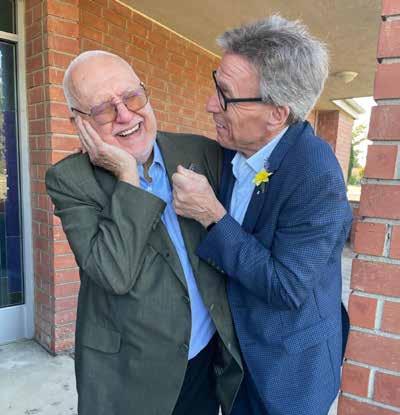
simplistic, perhaps. But for those of us with experience in choral directing and choral singing, we know how difficult an ideal it is to attain. It is so much less challenging to do things in a linear fashion, a step at a time, in a sedimentary plod. But Joe believed in his bones that holistic approach to rehearsing and being intensely musical during every minute was the secret to musical success. I know I am not betraying his legacy in saying that by consistently choosing this path Joe and all his choirs experienced countless rehearsal moments of “We have seen the light!”, as well as more than just a few moments of “Good grief, what was that about?!” But that was the bargain his ensembles always struck with him, and over and over again it easily proved worth the risk.
In the end, I believe what is important to remember about Joe’s rehearsals is that his true goal was— always—for every member of the choir to be the music in every moment, in every meaningful way possible, and to commit themselves wholeheartedly to the task. What a high bar, what a wonderful challenge he presents to us! What a lifelong goal: Be the music.
When I ventured into the choral world alone, it took very little time to realize that what I had learned most fully from Joe was that to which I had paid the closest attention: the art of rehearsal. And though I went on to learn further rehearsal skills from other brilliant conductors and teachers through lessons and observation, the bedrock of what I believe is great choral rehearsal technique resides with what I learned, what I believe everyone who studied with him learned, whether explicitly or implicitly, from Joe.
We learn the music while we learn the notes, and we learn the notes while we learn the music. The rehearsal is a Gestalt—that is, according to Merriam-Webster, “an experience so integrated as to constitute a functional unit with properties not derivable by summation of its parts.”
That sounds obviously desirable, even a bit
Finally, it is well known by all who knew him that Joe was always looking ahead, full of ideas, eager to peer around the corner and take part in what was next— right to the end of his life. Fittingly, he left us one more inspiring gift.
The Joseph and Melinda Huszti Choral Conducting Prize has now been established through the auspices of the California Choral Directors Association.
A $10,000 prize will be presented in a two-year alternating cycle, beginning in 2026, to a mid-career conductor and in the next cycle to an early career conductor. The unique aspect of this award is the primary criterion of the selection process is the one that Joe himself insisted upon: great rehearsing.
Thank you, Joe, for everything!
Edward Maclary, Director Emeritus of Choral Activities, University of Maryland

CCDA is honored to introduce the Joseph and Melinda Huszti Choral Conducting Prize The creative force behind the establishment of this program is Joseph Huszti, who, over his long career of pedagogy in rehearsal and performance, taught thousands of choral singers how to realize their artistic potential His influence on multiple generations of choral conductors throughout the United States remains profound. He wished to have that legacy continued through this prize under the auspices of CCDA.

The inaugural $10,000 mid-to-late career prize for 10 or more years of work will be presented at the 2026 ACDA Western Region Conference in San Jose, CA. At future Western Region Conferences, two awards will be given, both for mid-to-late and early-career conductors.
The prize honors the legacy of Joseph Huszti as a choral artist and teacher of the highest rank. The purpose of the two awards, as specified by Joe himself, is to recognize, reward, and encourage the cultivation of the highest level of artistry in choral conducting as exemplified in rehearsal and performance of music from the canon of choral literature. The awards will be given to individual conductors, not to the ensembles they direct or the institutions with which they are affiliated The selection process will give particular weight to artistry, creativity, musicality, and mentorship demonstrated in the rehearsal environment
Candidates must be members in good standing of ACDA and be nominated by a colleague or peer who is also a member in good standing of ACDA to the selection committee. Nominated candidates will be notified and may then choose to submit materials for consideration. Detailed information about the nomination process will be posted on the CCDA website in early 2025. Materials for consideration include:
Rehearsal videos (30-45 minutes each) from any three years of the most recent five years showing full front view of the conductor and full audio. Repertoire included in the rehearsal may be divided into three selections, and must represent any of the following three time periods:
1600-1900
1900-1950
1950-2000
Letters of support, up-to-date curriculum vitae and repertoire list, and a 500 word artistic statement
Performance videos (no longer than 45 minutes each) of any three years of the most recent five years
The prize is supported through a generous seed gift from the Huszti estate through the cooperation of Joe and Melinda’s daughter, Heather.

Additional gifts to the fund are gratefully accepted, and contributions can be made using the QR Code at left. Read more about the incredible legacy of Joe and Melinda Huszti at www.calcda.org/huszti-conducting-prize.

The 2024 Central, Coastal, and Southern Region High School Honor Choirs were held November 7-9 at Clovis North High School, Santa Clara University, and University of Redlands. Event chairs Kira Dixon, Miranda Ford, Marc McGhee, Kristen Walton and their teams did an amazing job organizing all the details. All of us at CCDA appreciate you!
The 2025 All-State Honor Choirs will take place at CASMEC in Sacramento from January 16-18, 2025, with guest directors Dr. Edryn J. Coleman (High School TTBB), Dr. Kimberly Dunn Adams (High School SSAA), Ms. Maria Ellis (Junior High School SATB), Dr. Marcela Molina (Junior High School SSAA, and Dr. A. Jan Taylor (High School SATB). Rehearsals are open for observation by conference attendees, so we hope you will visit Sacramento State for some inspiration from our wonderful guest conductors.
We also hope you can attend the honor choir concerts on Saturday afternoon, January 18th, at the historic
Sacramento Memorial Auditorium. There will be two concerts: one at 12:00 p.m. featuring the Junior High SATB, Junior High SSAA, and High School SATB choirs, and one at 2:30 p.m. featuring the High School TTBB and High School SSAA choirs.
Thanks to the generosity of Resounding Achord and everyone who has donated to the CCDA Honor Choir Scholarship fund, CCDA was able to provide financial assistance to over 80 All-State honor choir students. Special thanks to Susie Martone for spearheading and organizing more corporate sponsorships of honor choir scholarships. You can donate at any time throughout the year; find the donation button on the All-State Honor Choir website (calcda.org/all-state)!
Please keep an eye on your email and the All-State Honor Choir website for the most up-to-date information. We’re looking forward to another amazing year of All-State Choirs at CASMEC!
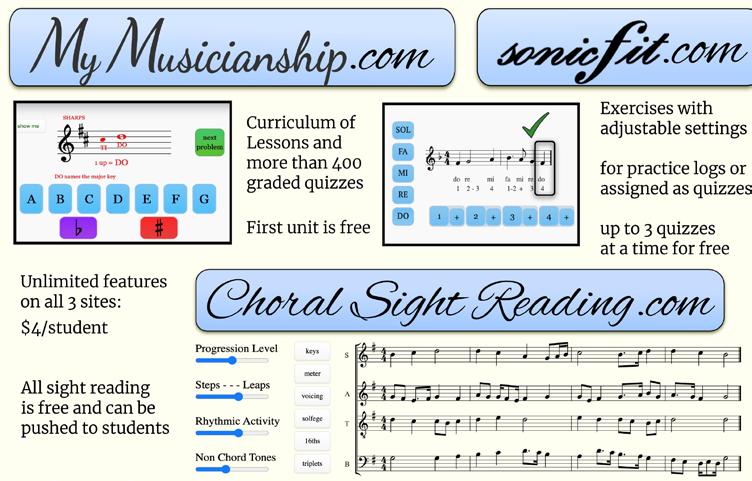

Dr. zAnAiDA
stewArt robles is an award-winning composer, vocalist, and teacher she is in
demand as a composer, vocalist, clinician and adjudicator for competitions, festivals, and conferences related to choral and solo vocal music
It
is truly an honor to serve as your Choral Composition Chair on the CCDA Advisory Board. Serving CCDA in this capacity for the last 3 years has been rewarding in ways I never imagined. One of my favorite aspects of this job is getting to know, work with, and be inspired by so many brilliant California composers. This work can be challenging, but fortunately I don’t have to do it alone.
I am pleased to introduce our 2024-25 Choral Composition Committee members. These folks are members of CCDA who serve as adjudicators for the CCDA Heussenstamm Choral Composition Contest. They also offer vital input and assistance on composition-related articles, conference sessions, honor choir commissions, and member correspondence.
2024-25 Choral Composition Committee Members
Judith Baity
Juhi Bansal
Matthew Brown
Saunder Choi
Marianne Foreman
Amy Gordon
David V. Montoya
I asked our Choral Composition Committee for some ideas about what would be interesting and useful for me to share with composers in this issue of Cantate. Here are some tips for finding and building connection and community as a composer (or for anyone, for that matter!)
Composing music can be a very solitary task. Composers who aren’t members of a performance ensemble may find it difficult to build and maintain relationships for professional, emotional, and social well-being. Composer Juhi Bansal says, “It’s a topic that can be surprisingly hard when someone doesn’t begin totally immersed in the choral world…” Juhi recommends “finding [a] choral community that resonates [with you] to build more lasting relationships.”
“Perplexity” is the name of a conversational AI search engine I use for comprehensive and cited answers to specific questions and
directives. I asked Perplexity for tips for finding and building connection and community. Here’s my edited version of Perplexity’s list of effective strategies for finding and building connection and community:
Start conversations: Attend concerts and conferences. Introduce yourself to presenters or other artists you recognize at the event. Be gracious and demonstrate gratitude with every interaction. If time permits, use conversation starters to spark discussions and connections during breaks and before and after the event.
Host meet-ups: Organize events that encourage networking, such as meet-ups focused on shared topics. A meet-up can be as simple as coffee with a single colleague, conductor, or student. It can be having drinks with a few peers at a local tavern. It can be a party at home or someplace special where you fill the room with people celebrating a holiday, a special occasion, or an achievement.
Create networking channels: Establish dedicated spaces for members to connect and collaborate. Honestly, that’s what I use social media for. Using social media specifically for this purpose has helped my career immensely. It’s important to remember, though, that connections and collaborations through networking channels don’t take the place of actual conversations and person-to-person meetings necessary to foster real relationships and communities. Networking channels can also be created in person as a break-out activity in a group or in any number of creative ways you can imagine.
Encourage mentorship: Implement a mentorship protocol to foster relationships between experienced and junior composers. Many choral organizations like Chorus America and Chicago A Cappella have excellent existing mentorship programs with which to get involved. But mentorship can materialize organically through intentional relationships cultivated using the strategies above.
Celebrate achievements: Recognize and celebrate peers’ successes to strengthen community bonds. In other words, never miss an opportunity to party with your people.
The winning composer will receive $500 and be invited to attend the 2025 CCDA ECCO Summer Choral Conference for FREE! Could you be this year’s winner? Get ready to submit your composition with the chance to have it distributed to and read by choral directors from all around the state. Please visit www.GeorGeHeussenstamm.com to learn more about our late, great, talented, and generous benefactor.
Eligibility: Adult composers are invited to submit a single, original composition, not from a larger set. We are looking for single, stand-alone compositions, not sets and not arrangements. Shorter works (3-5 minutes) are preferred. (Previous winners are not eligible to apply.) Winners agree to become members of ACDA.
Scores: Please submit your anonymous, unpublished* score, a cappella or with piano accompaniment (no obbligato instruments), any voicing, along with an anonymous demo recording (MIDI is acceptable but voices are preferred) to znrobles@Gmail.com. Please visit the CCDA website to enter all composition and composer information via Google Form.
NOTE: Please be sure to remove composer’s name ANYWHERE that it might appear: title page, copyright notice, headers/footers, etc. and even on audio file information.
Format: All scores must be submitted in PDF format AND all audio files must be in MP3 format.
Dates: Submissions will be accepted from Feb. 15, 2025 through Mar. 15, 2025, 11:59 p.m. PDT.
Submissions that do not meet the above requirements WILL NOT BE CONSIDERED. Compositions will be judged on the following criteria: Overall Effect, Overall Craft, Harmonic Interest, Rhythmic Interest, Melodic Interest, Text Usage, Originality, and Cosmetics of Score. As we are interested in finding works that might be considered for inclusion in the CCDA Choral Series with Pavane Publishing, we will also consider the composition’s marketability.
Winner: The winning composition will be chosen by the CCDA Choral Composition Committee and will be announced on the CCDA website at the end of April 2025. The winning composer will receive a scholarship for tuition, room, and board at ECCO 2025, and will have their composition copied, distributed, and read at the summer conference. The winning composer will also receive a $500 cash prize. The winning score may be given consideration for inclusion in the CCDA Choral Series on Pavane Publishing. [NOTE: CCDA reserves the right to declare “no winner” if it is deemed appropriate.]
*Unpublished is defined as “not released for public distribution or sale.” Self-published works and works published in audio and/or video formats are also ineligible; if the public can access any version of it, then it is ineligible.
Contact Zanaida Robles at znrobles@Gmail com for more information.


Hagenberg
Elaine Hagenberg France June 15-19, 2026
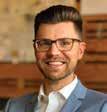
Pura Vida Choral Festival

Jake Runestad / Pearl Shangkuan Costa Rica
June 17-22, 2026


Festival for Women’s Voices

Iris Levine / Jocelyn Hagen Baltics
June 27-July 1, 2026




Right: members of the San Dimas High School choirs (Jared Pugh, director) perform their annual Winterfest program; below: the Central Valley Youth Chorus (Beth Holtan, director) present a holiday concert in Modesto. Turn the page for more photos, and send your best shots to cantate.editor@gmail.com if you’d like them considered for inclusion in a future issue!

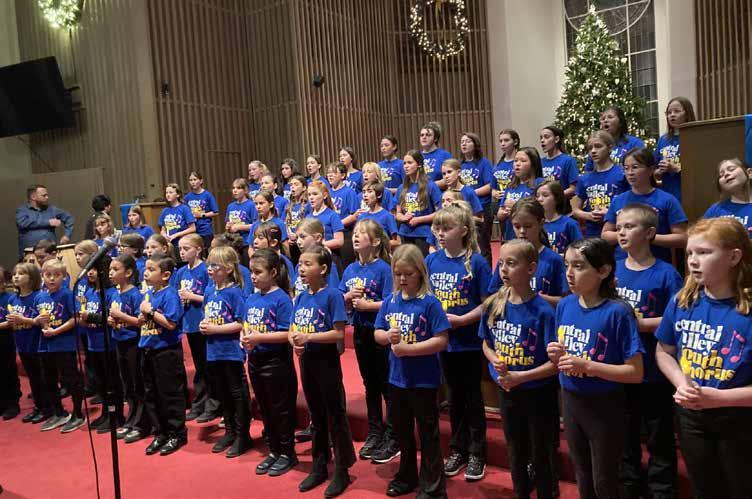

Right: a member of the Oakland Youth Chorus (La Nell Martin, artistic director) enjoys breakfast with Santa; above: the Reedley College Choir (Kirstina Collins, director) inaugurates the school’s new McClarty Center for Fine and Performing Arts; below: the Victorian Carolers of Enterprise High School (Alissa Gibbs, director) mark their 34th year of caroling for the Redding community.


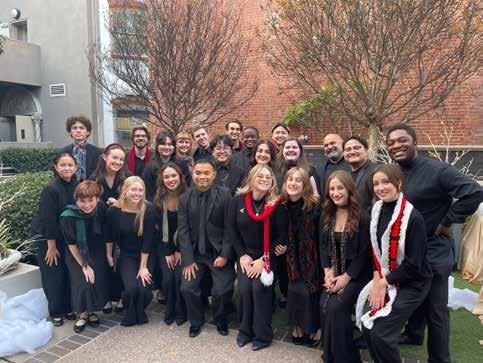
Left: the graduating seniors of CSU Long Beach gather for one more photo together; below: Resounding Achord, Vivace Youth Chorus, and the Nova Vista Symphony combine forces under the baton of Kristina Nakagawa to perform “Befana,” a new Christmas cantata by San Francisco composer Kirke Mechem, in Saratoga.
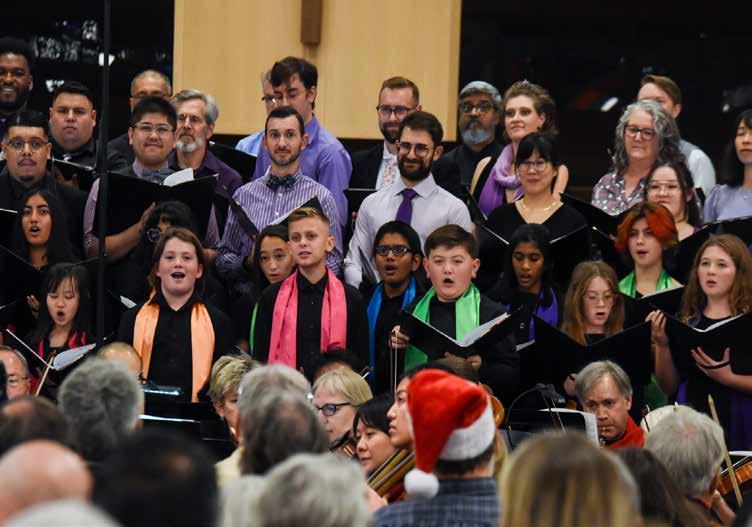

Above: the Cantare Chorale and Nova Youth Choir (Julie Haydon conducting) perform “Hymn to Freedom” at Cantare’s Bay Area holiday concerts; below: Chris Peterson and Rob Istad of CSU Fullerton hang out during a gig at Warner Brothers Studios in case this parking spot’s owner shows up.


Above: a volunteer usher welcomes guests to the Festival of Christmas concert at Trinity Presbyterian Church in Tustin (Kieun Steve Kim, director of music ministries); right: choristers from the Abraham Lincoln High School Chamber Chorale (Kira Dixon, director) take a big deep breath before heading out to deliver carol-grams to the San Jose community.

Thursday, January 30: Deadline to apply to present at ECCO
Saturday, February 8: Board and Advisory Council Meeting
Friday, March 14: Deadline to apply for scholarships and grants
Saturday, March 15: Cantate submission deadline
Saturday, March 15: CCDA COMPOSITION CONtESt deadline
Sunday, April 6: CCDA Annual General Meeting, 3 p.m. (ZOOM)
Visit www.calcda.org for


This list includes donations made between november 6, 2023, and december 6, 2024. Donations made after that time will be acknowledged in the next Cantate and may be found on our website. Thank you for your support!
President’s Circle
Diamond ($1000 and higher)
Resounding Achord
Dr. Arlie Langager*
Ludus
Susie Martone
David Masone and William Hall Legacy Giving, in honor of Dr. Gene Peterson, Dr. Jonathan Talberg, and Dr. Joseph Modica
President’s Circle
Platinum ($500-$999)
ACFEA Tour Consultants
Dr. Daniel Afonso Jr*, in honor of Bill Hatcher
Mike and Julie Dana*, in celebration of ECCO conference
Lou and Mary De La Rosa*, in memory of Jim Heiner
Angelina Fitzhugh
Lori Marie Rios and Bryan D. Walker*, in honor of Shirley Nute, Don Brinegar, and Bruce Mayhall-Rastrelli
Jo-Michael and Mary Scheibe
Burt and Polly Vasché* National Concerts
President’s Circle
Gold ($300-$499)
Florence Agcawili
Diane Guyett, in memory of dear friend
William Hall
Duane and Linda Lovaas*
Oscar Luna II
June Ou
Susanna Peeples*, in memory of Germán Aguilar
Cliff and Cindy Samson, in celebration of Joe and Melinda Huszti
Dr. Jonathan Talberg*, in honor of Dr. William Hall
Phil Wyatt, in memory of Alan Caddick
President’s Circle
Silver ($100-$299)
Patrick Burzlaff
Lauren Diez
Dr. Cari Earnhart
Maggie Goodrich Gutierrez
Mary Hamilton
Dr. Scot Hanna-Weir
Semele Heller
Kent Jue and Steven Kirk
Anbinh Kao
Albert Mabeza
MaryClare Martin*, in honor of Lena and Art Babin, and Signe Boyer
Richard Martone
Marc McGhee
Kristina and Ryan Nakagawa*, in memory of Lois Carah and Joe Huszti
Molly Peters, in honor of Lori Marie Rios
Dr. Zanaida Robles
Haruna Shiokawa
Sponsor ($50-$99)
Felicia Bessent
Ruth Charloff
Allison Crose
Srinu Dongole
Jennifer Gaderlund
Jason Gallardo
Robert Hepple
Suzanne Martone
Yardley McNeill
Laryssa Sadoway
David García Saldaña
Heidi Vance
Dr. Ángel M. Vázquez-Ramos and Jody R. Vázquez*
Amber Welsh
Supporter (up to $50)
Srijoy Aditya
Stephanie Alvarez
Yasmin Angeles
Sindhuja Balasubramanian
Pritom Baruah
Heather Bennett
Andrew Berg
Heather Bishop
Florence Bray
Christopher Chappell
Tingting Chen
Stephen Commisso
Keith Conley
Ann Day
Trang Do
Loreen Dunbar
Shelley Durbin, in memory of Charles Irvin
William Eisenstein
Beth Holtan
Tracey Jue
Swarajya Kalapatapu
Drew Lander
Prof. Desiree LaVertu, in appreciation for the work and dedication of Lori Marie Rios
Daniel Lim
Hyobin Lim
Sara Ludlow
Veena Mahadevan
Oanh Mandal
Kyle McClintock
Katharine Nelson
Samantha T. Nickel
Erica Orcharton
Issac Pereschica
Patchareeya Pumpuang
Katie Schramm
Aaron Schultz
Heena Shah
Aparna K Shankar
Jennifer Sumant
Noah Sutherland
Genevieve Tep*
Randeep Toor
Muthuswamy Venktaramani
Sricharan Vinnakota
Xiaopeng Wang
Founder’s Circle



up to

for your project or professional activities through grants and scholarships like these:
up to $500 to support special projects that are specifically available for BIPOC and/or underrepresented choral directors in California

up to $1500* for special creative projects such as presentations, research, travel, performances, etc.
*generously sponsored by our partner, Ludus


funding to attend the CCDA Summer Conference at ECCO (covers dorm lodging, registration, and meals)

Application
DEADLINE: March 14, 2025
up to $1500 to attend a nationally recognized conducting workshop scan for more info and to apply

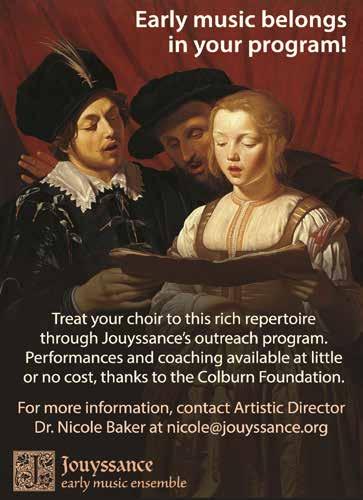







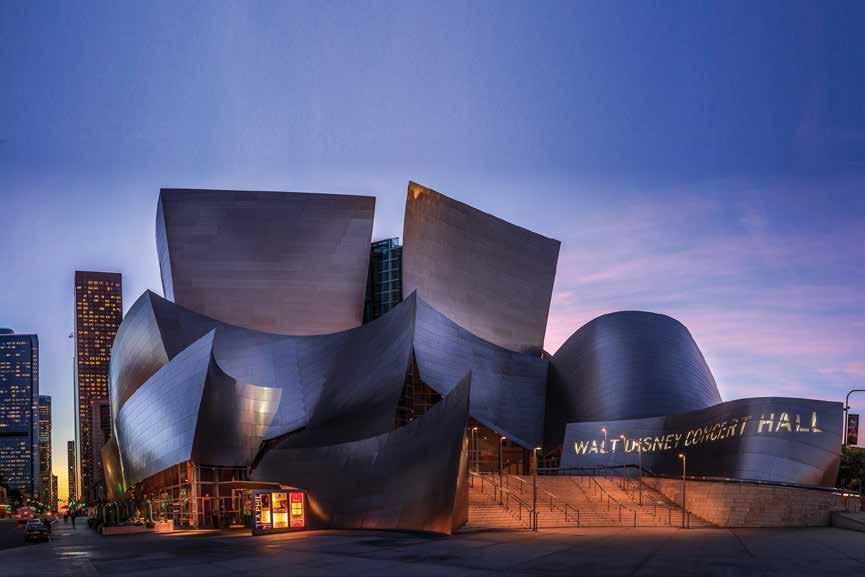
Organizational Application Deadline: December 23, 2024
(5 th-12 th School Grade SATB)
Individual Audition Video Submission Deadline: March 15, 2025


Teaching assistantships, scholarships, and need-based financial aid available. Email uscmusic@usc.edu for more information.
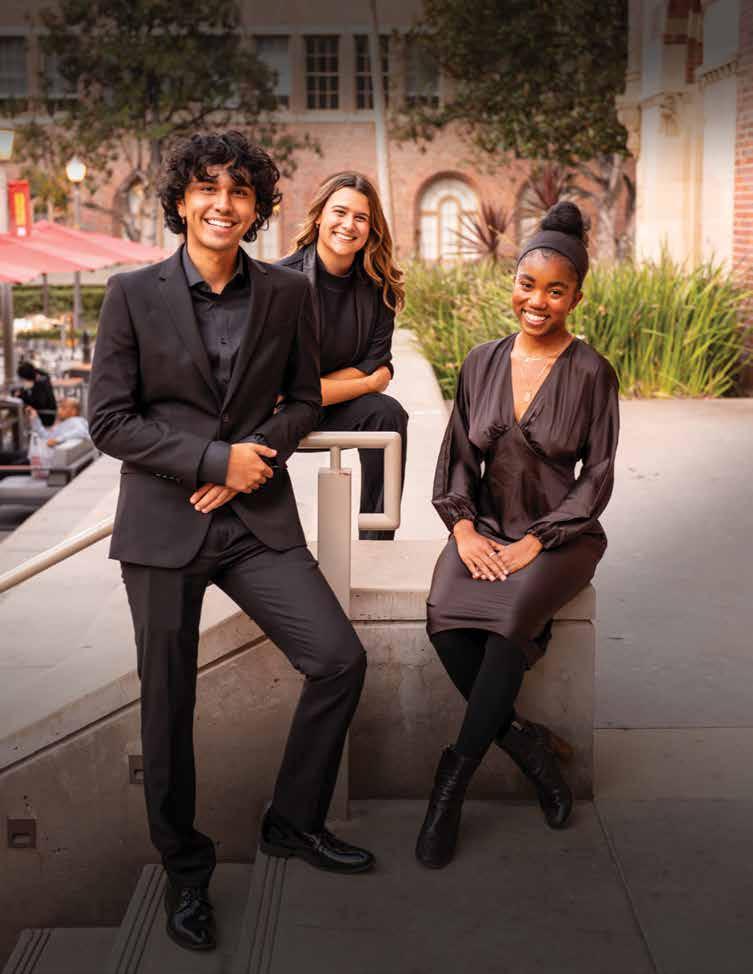
DEGREES OFFERED
Choral Music BM, MM, DMA Sacred Music MM, DMA
APPLICATION DEADLINE DECEMBER 1, 2024 music.usc.edu/choral-sacred-music
@USCTHORNTON
Na-Young Shin and Adrien Rangel-Sanchez were awarded the 2025 Orange County Outstanding Music and Arts Awards. Ms. Shin is a Teacher on Special Assignment in the Arts in Garden Grove Unified, and Mr. Rangel-Sanchez is a secondary vocal music teacher in Irvine Unified.
CCDA’s previous All-State Honor Choir Co-Chair, Angelina Fitzhugh, was awarded the Outstanding Music Educator Award by the CMEA Bay Section. Congratulations, Angelina!
Resounding Achord, under the direction of Kristina Nakagawa, collaborated with Nova Vista Symphony in December to perform Befana, a new Christmas cantata by “dean of American choral music” and San Francisco resident Kirke Mechem. Matthew Martinez conducted the Long Beach Chorale and Chamber Orchestra in the Southern California premiere of the same work a week later.
The San José State University Choraliers, under the direction of Jeffrey Benson, performed alongside Broadway and West End star Sarah Brightman in December.
Kent Jue and Shelley Durbin conducted the CMEA Bay Section Honor Choirs held in November at San Jose State University.
CCDA members Roger Emerson and Niké St. Clair are presenting at the CASMEC conference in Sacramento in January. Performing choirs include Los Gatos High School Treble Choir (Maricel Riley); Bonita High School: Echoes of the Spirit (Ryan Yoder); San Diego State University Choir (Arian
Send us news to share about hirings, retirements, collaborations, commissions, premieres, awards, or projects!
Khaefi); Albany High School Chamber Singers (Kate Huizinga); and Fresno City College City Singers (Jennifer Hansen Heder).
For the first time, CCDA’s Choral Leadership Academy was offered in conjunction with the Music Association of California Community Colleges Conference in San Diego in November. Lori Marie Rios worked with Arlie Langager to prepare sessions, and presenters Darita Seth, Ramon Cardenas, Eliza Rubenstein, and Matt Falker shared professional perspectives with the students. The CLA students also participated in the nearly 150-voice MACCC Intercollegiate choir, coordinated by Karen Miskell and conducted by USC professor emeritus Jo-Michael Scheibe
San Jose Symphonic Choir (Leroy Kromm, conductor) performed Mendelssohn’s Elijah to a sold-out crowd as part of their 100th anniversary season.
The Davis Sr. High School Jazz Choir will celebrate its 50th anniversary at their annual Cabaret Dinner on April 11 and 12 under the direction of Natascha Bach. Natascha is working hard to rebuild the DSHS choral program. In an effort to plant seeds for the future, the Madrigals and Jazz choir are hosting outreach performances for the district’s elementary and junior high students.
New CCDA member and experienced band/choir director Karen Davidson used Proposition 28 funding to create a full time music program at Louis Pasteur Middle School in Orangevale, near Sacramento. After several years of splitting her assignment between Pasteur and Casa Roble High School,
both in the San Juan USD, the administration accepted her proposal to expand the middle school program under her leadership.
The Central Valley Youth Chorus, now in its second year, sponsored its first “Young Voices in Song” choral workshop and concert in November 2024. Judith Herrington of the Tacoma Youth Chorus was guest clinician and conductor, with six choirs and 180 singers participating. During her residency in Modesto, Judith also gave workshops for local teachers and students. The CVYC was founded in 2023 by Polly Vasché with Chelsea Costa Foy and Beth Holtan. Beth is Artistic Director and Conductor.
Another new choral hire resulting from Prop 28 funding is Liisa Davila at Joseph A. Gregori High School in Modesto. The one choir class at Gregori had been taught for five years by instrumental teacher Paul Herrera, who was so dedicated that he attended ECCO to hone his vocal and choral skills. Thank you Paul, and best wishes to Liisa as she continues to grow the choral program at Gregori!
The Santa Clarita Valley was represented at this year’s Disneyland Candlelight Processional concerts this year with singers from Santa Clarita Christian School (Susi Johnson); Saugus High School (Kaytie Pi), and Valencia High School (Christine Mocha). The performances were December 7 and 8, and Kathryn Hahn from “Agatha All Along” was the narrator.
Thanks to Membership Director Molly Peters for coordinating our news and notes. Send your items to mepeters79@gmail.com!
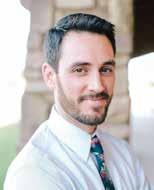
burzl Aff
holds a Ba in music from luther college and a ma in choral conducting from csula he has taught for 10+ years in the Kern high school district and currently worKs as the director of vocal music at centennial high school. patricK has served as a guest conductor, adjudicator, or clinician for various choral festivals when he ’ s not conducting, you can find patricK playing piano at his church or out on the golf course
Guest columnist: christopher BorGes
HelloCalifornians! It’s good to be back in the Golden State after six years teaching abroad in Brazil, Morocco, and Nepal. In March I was given the opportunity to conduct the Association for Music in International Schools (AMIS) European Middle School Girls’ Honor Choir in Munich, and while it was an honor choir, much of the music I chose is highly accessible for middle school singers. Have a look at the list below, in performance order, and you can also see the performances online at https://amis-online.org/page/ concert-showcase-23-24 (scroll down). For more information, feel free to email me at christopher.borges@burkes.org.
For our opening selection, I chose Joy Ondra Hirokawa’s “Lamma Banda Yatathanna” (Hal Leonard), an enchanting Andalusian piece that allowed the students to process into the concert hall as they sang. It’s quite an easy two-part piece, the Arabic is very accessible, and it has a lilting, gentle flow that lends itself well to procession while also featuring some additional instruments. I love this piece because it’s so singable and it’s a very well-known work, especially in Morocco, where I also taught it to my middle schoolers.
Our second piece, “Sing to Me” (Choristers Guild), features music by Cynthia Gray and text by Ella Wheeler Wilcox. One of my intentions for this honor choir was to feature women as composers/arrangers and lyricists as much as possible, and this piece accomplished both. It’s a melody that gives lots of room to teach interpretation, phrasing, and dynamics, and the middle schoolers and I really enjoyed talking through the poetry.
The very first time I heard Rollo Dilworth’s arrangement of “Walk in Jerusalem” (Hal Leonard) was in an ACDA Junior High Honor Choir that my oldest child was privileged to be a part of. If you’re like me, you know that Rollo is a “sure thing,” and virtually any piece he’s written or arranged is going to be wonderful. This one blends the spiritual “I Wanna Be Ready” with a wonderful piano accompaniment and many gospel stylings.
Students (especially the altos!) will love to dig into this, and the joy of the piece will really shine through.
One of the first pieces I taught while living in Brazil was Gabriel Levy’s “Ciranda em Canône,” a “circle dance” that singers sing and move to (often on the beach!), usually holding hands and performing simple movements. It’s available online, although often only two-part; e-mail me for the 3-part canon. I was able to ask a Brazilian choreographer for some basic choreography, and the students in Munich enjoyed the piece so much that we auditioned a smaller group to perform the dance. It was one of their favorite pieces, as well as one of the simplest.
As a grad student at Florida State University back in the early 2000s, I found Uno Naissoo’s “Metsa Telegramm [The Woodpecker’s Warning]” (Shawnee Press) in a stack of free repertoire. I immediately loved the word painting, repetitive Estonian text, and rhythmic energy throughout. It also has a wonderful message of environmental stewardship, so it can be used in a variety of settings with your students. Don’t let the language scare you: you can do parts in English or really stretch your students and sing it in Estonian with the attached IPA guide.
Next up was an enchanting Latin piece from Puerto Rico, “Plena” (Lorenz), expertly arranged by Diana V. Sáez. Not only did the middle schoolers love singing (and moving to) this piece, I thoroughly enjoyed researching the plena, often called the “sung newspaper” because it spread messages among the lower classes, through which they gained empowerment through parody.
Our closer was an arrangement by California’s own Corie Brown, “Never One Thing” (Hal Leonard), of a song by May Erlewine. We accented this one with a video montage of the honor choir students in a variety of groupings to celebrate their unique contributions to this wonderful ensemble. It made for a beautiful, touching, and highly memorable closing to the performance, which was evident by the audience’s response.
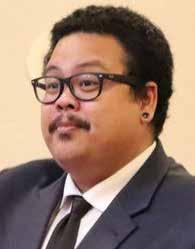
Albee MAbezA is the director of choirs at woodside priory school in portola valley where he conducts the middle school choir, chamBer singers and concert choir he is also an associate conductor at the vivace youth chorus in san jose. alBee also recently founded pariter, a tenor-Bass vocal ensemBle also Based in san jose he received his Bachelor’s degree in music education and vocal performance from san jose state university
Whenthe world feels uncertain, we turn to music to bring us together. The following pieces are meant to bring together our ensembles as friends and family to do many things: worship, dance, grieve, have fun and of course, sing. The hope is that you will be able to gather your tenor-bass ensembles to be together again and make lovely music. Here are a few examples of ways to gather your low voices back together again.
BoB GiBson (1931-1996), Alex HA ssilev And Glenn YArBrouGH (1930-2016), Arr. CAntus
There’s a Meeting Here Tonight TTBB a cappella Timothy C. Takach Publications TCT-CTS-001
We gather to worship. Originally written as a Methodist camp song, this tune was later arranged by folk singer Bob Gibson. American Gospel duo Joe and Eddie put their own fun, hip spin on it and it became one of their signature songs. A lot of the Cantus arrangement’s most charming aspects revolve around the use of unison singing and simple two-part harmony that then later in the piece evolves into beautiful four-part Gospel harmony. It features a great tenor solo feature in each of the refrains.
KAtHleen All An this brightening silence TTBB choir a cappella MusicSpoke
We gather to mourn. Composer Kathleen Allan wrote this piece as a commission by the Newman Sound Men’s Choir to honor a terrible moment of loss from the early 20th century: the Newfoundland Sealing Disaster. Allan describes her composition as “a poetic depiction of loss and hope.” The poetry was written by her husband, T. Benton Roark; the fate of the lost seamen is described as a “grey angel.” The haunting spirit, flowing in the higher voices of this composition can be heard flowing above the text. By the end, the spirit’s theme can be heard throughout the ensemble, though as a peaceful current in the ocean.
JoHn lennon (1940-1980) And PAul MCCArtneY, Arr. riCH HA stY With a Little Help from My Friends TTBB a cappella Barbershop Harmony Society 211550
We gather to play. From Sgt. Pepper’s Lonely Hearts Club Band, this is a fun tune about friendship and togetherness. The arrangement passes off the iconic melody between the Tenor 2 (or lead) line and the Bass 1(or baritone) line in the verses. The outer voices also have fun with walking Bass lines and soaring Tenor 1 lines. Rich Hasty used rich lush, barbershop-style voicing and harmony to add life to an already upbeat fun tune.
JMt dosoo, Arr. Jester HAirston (1901-2000)
No Ne Li Domi
TTBB a cappella Bourne Co. 090497
We gather to dance. This piece is written in the Adangbe Tribe language of Ghana and tells a fun folk story, describing a dance competition in a village. Some people dance for fame, others compete for glory. In this case, the prize is the tastiest, meatiest part of the chicken. Consider using percussion and having a little dance competition after the English section of the song before the coda begins. Have fun and let your singers let loose on this chart!
HAns leo HA ssler (1562-1612), ed. sCott A. tAYlor Cantate Domino
TTBB a cappella
Alliance Music Publications, Inc. AMP0757
We gather to sing. Any medium to medium advanced tenor-bass ensemble would do well singing this motet by Hans Leo Hassler. As the editor notes, “beautiful tone quality is important, [but] an overly legato approach should be avoided.” The lines dance along all of the parts and all of the entrances should be treated equally to keep the momentum of the piece moving. Sung a cappella or with an organ reinforcing the voice parts. Also includes an optional opening monophonic chant at the beginning of the piece.
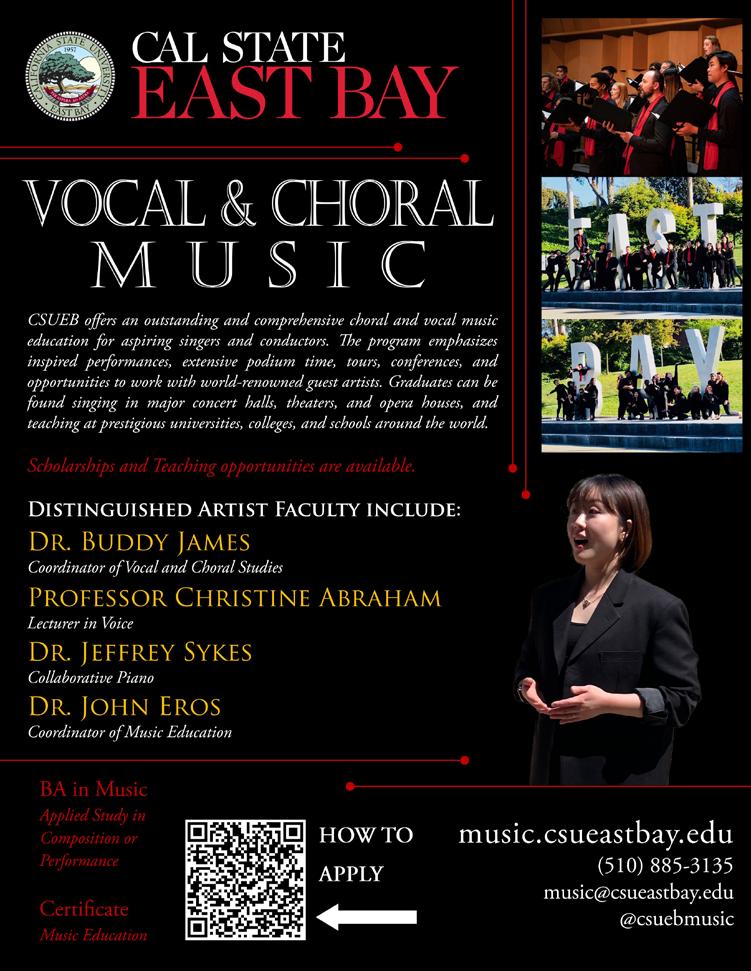

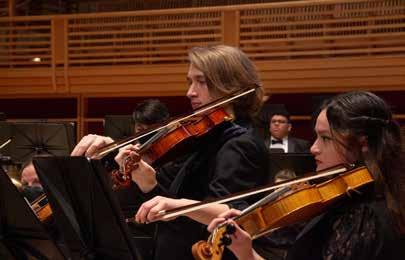

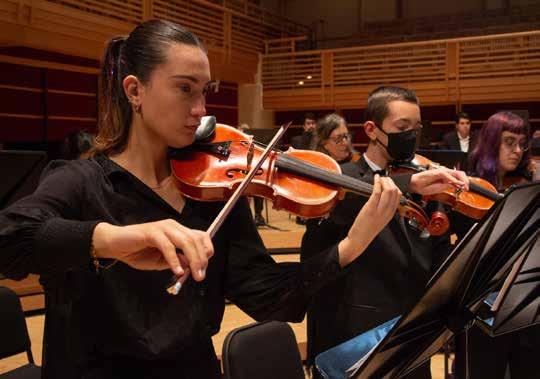
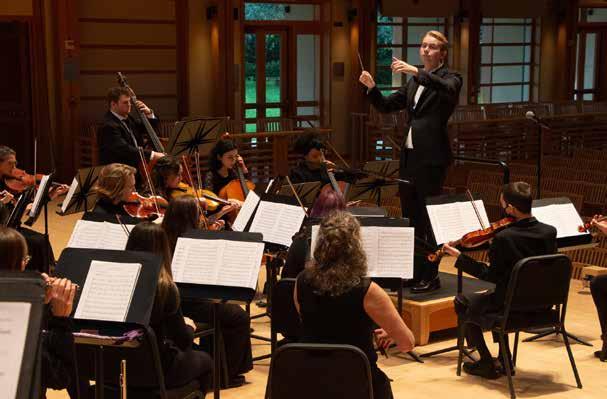



2 |

Accompanists available Everyone who auditions is considered for a Music Scholarship music.sonoma.edu
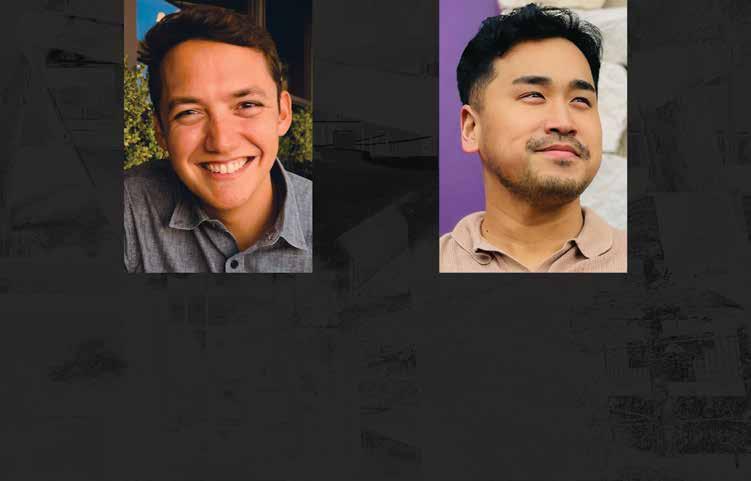
CSULB Choral Studies congratulates two extraordinary alumni from our graduate Choral Conducting program. Bravo to Dr. Matthew Lyon Hazzard (MM 2019) on his appointment as Director of Choral Activities and Vocal Studies at Mt. San Antonio College and to Darita Seth (MM 2023) on his appointment as Director of Choral and Vocal Studies at Santa Rosa Community College. The Beach Family is proud of you both.
Are you ready for the next step in your career? For more information about CSULB’s graduate program in choral conducting, please visit csulb.edu/music or contact Dr. Jonathan Talberg at jonathan.talberg@csulb.edu
President • Past President President’s Council
Executive Committee - elected
Officers
Treasurer
Financial reporting; budgeting; Cantate ads; event registration
Directors
Membership
Facilitates engagement with all levels of membership; leads committee of member representatives
• Voting members; oversee, serve, and represent working groups
K-12 School Programs
Education & Student Outreach
Serving conductors based ensembles; adult choirs; community church children’s GALA choirs; professional; adult and children’s and TB ensembles; America members (ACDA Lifelong Community Music in Worship Serving High school teachers (large and small schools; urban and rural); middle school/junior high school teachers, auditions for regional and all-state honor choirs; elementary choral and classroom music; (ACDA Youth Choirs)
Advisory Council
Serving post-secondary conductors; post-secondary students; conductors of all types of ensembles including parttime, emerging/new conductors, volunteer conductors; interested high school students; student activities (ACDA Collegiate Choirs)
• Chairs & Subcommittees
K-12 School Programs
Chairs and Committees

High School, Middle/Junior High School; honor choirs, CASMEC, Honor Choir scholarships, Elementary; SSAA; TTBB; vocal jazz, showchoir, a cappella repertoire; SCVA, CMEA, OAKE liaisons (ACDA and Western Region R&Rs)
Education & Student Outreach Chairs
University; Community College; Music Education; Undergrad and Graduate Student Programs; ACDA Student Chapters; Choral Leadership Academy programs; NCCO liaisons (ACDA and Western Region R&Rs)
Community Committees include Worship; Community Community Youth GALA choruses; Choral Composition; Professional Choirs; America liaisons Western Region
President • President-Elect

Development Fundraising; manage professional development grants; honor choir scholarships; Vision for the Future
conductors of faithensembles; community community and children’s choirs; professional; children’s treble ensembles; Chorus members in CCDA Lifelong Choirs)
Secretary
include Music in Community Choirs; Youth Choirs; choruses; SSAA; TTBB; Composition; Choirs; Chorus liaisons (ACDA and Region R&Rs)
The duties may be adapted and their activity portfolio may represent the following areas: Professional Development and Conferences; Retired Members; Pedagogy and Practice; Volunteer Activities; History, Archives, and Institutional Memory; Communications, Marketing, and/or Public Relations
Communications Committee
Committee includes Cantate Editor, Website Editors, Social Media Manager; Email Management; eNewsletter; Communications Strategist membership;
Executive Administrator (ex officio)

Fosters a more inclusive, equitable, and welcoming choral community throughout California; helps CCDA’s programs, practices, and initiatives align with our core DEIAB values; collaborates with national and regional ACDA to promote inclusivity; provides resources that support both choral directors and their singers
Summer Conference at ECCO; All-State Honor Choirs; Regional Honor Choirs; CASMEC Coordinator; Choral Leadership Academy; Region Conferences and Workshops; ACDA Western Region and national conference reps
President
Arlie Langager (858) 774-0412 alangager@miracosta.edu
President-Elect
Kristina Nakagawa kristina m nakagawa@ gmail com
Vice President
Chris Peterson (562) 453-9851 cpeterson@fullerton.edu
Treasurer Genevieve Tep gtep@seq org
Development Daniel Afonso dafonso@csustan.edu
Membership Molly Peters mepeters79@gmail.com
Community and Worship
Buddy James buddy james@ csueastbay.edu
DEIAB
Kellori Dower drkellori@gmail com
Education and Student Outreach
Cari Earnhart cearnhart@csufresno.edu
K-12 Student Programs
Patrick Burzlaff patrick burzlaff @kernhigh.org
Director at Large William Zinn wzinn6023@gmail com
Cantate magazine editor
Eliza Rubenstein cantate.editor@gmail.com
Web developer
John Nguyen
Social Media Coordinator
Position open
E-mail communications
Emily Moore emoore@musd.org
Executive Administrator
Kathleen Preston 921 N. Harbor Blvd., #412 La Habra, CA 90631-3103 exec admin@calcda.org
Children’s and Community Youth
Kent Jue kjue@ragazzi.org
Community Choirs Yewon Lee yewonlee98@gmail.com
Choral Composition
Zanaida Robles znrobles@gmail com
Music in Worship
Steve Kim kieunstevekim@gmail.com
SSAA Choirs
Iris Levine irislevine@mac.com
TTBB Choirs
Albee Mabeza amabeza@prioryca org
Vocal Jazz
Andreas Preponis apreponis@ laspositascollege.edu
Summer Conference at ECCO
Jeffe Huls jeffe.huls@gmail.com
CCDA Conference at CASMEC
Jennifer Heder jenniferheder@gmail com
CLA/CASMEC
Cari Earnhart choralleadershipacademy @gmail com
CLA/MACCC
Karen Miskell karen.miskell@vvc.edu
All-State Honor Choirs
Jenni Gaderlund Susanna Peeples honorchoir.allstate.ca @gmail com
Central Region honor choir Marc McGhee honorchoir central ca @gmail com
Coastal Region honor choir Kira Dixon coastalhonorchoirchair @gmail com
Communications Coordinator
Jasmine Nicholson jnicholsonconsult @gmail.com

Chamber Choir, Treble Choir, University Chorus Opera Workshop, Fully-Staged Operas
Undergraduate: BM Music Education, BM Vocal Performance Graduate: MM Choral Conducting, MM Vocal Performance, Graduate Artist Diploma

Dr Arian Khaefi, Director of Choral Studies akhaefi@sdsu.edu
Dr Ramon Cardenas, Choral Music Education racardenas@sdsu.edu


